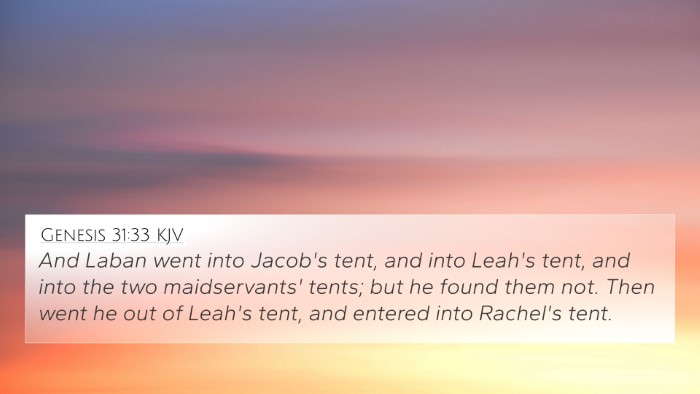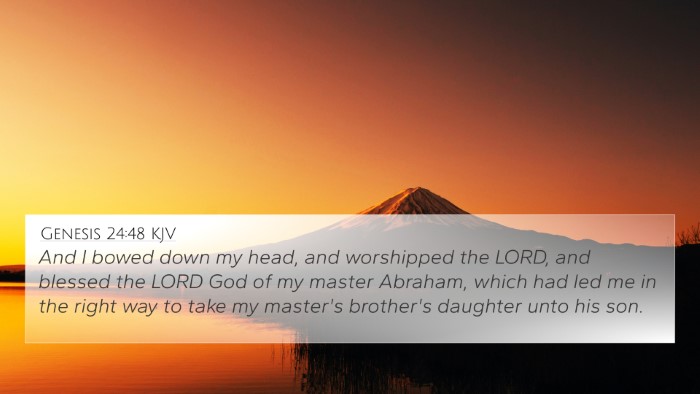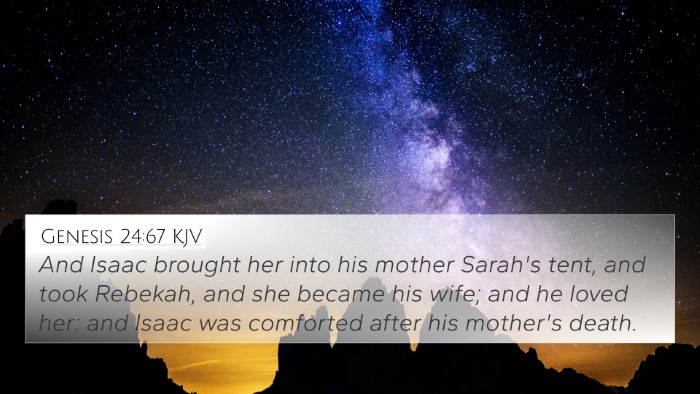Understanding Genesis 24:28
Genesis 24:28 states: "And the damsel ran, and told them of her mother's house these things." This verse captures a pivotal moment in the narrative of Abraham’s servant seeking a bride for Isaac. The servant has just had a significant encounter with Rebecca at the well, where he prays for guidance and witnesses God's providence as Rebecca fulfills the sign he requested. This verse signifies Rebecca’s immediate response to the news of her potential betrothal, highlighting both her eagerness and the cultural customs surrounding marriage in biblical times.
Contextual Analysis
Matthew Henry notes that Rebecca’s action of running symbolizes her willingness and enthusiasm. It represents a spontaneous and joyous response to the divine unfolding of events. Such immediacy underscores the importance of responsiveness to God's call and direction in one’s life.
Albert Barnes elaborates on the significance of communication and family involvement in the marriage process. Rebecca, by telling her family, acknowledges the role of familial consent and involvement, which were critical values in ancient Near Eastern culture. This reflects a broader theme of the importance of communal decision-making in matters of relationships and contracts.
Adam Clarke interprets the act of Rebecca running to her family as a testament to her character. It reveals her as someone who is proactive and responsible, willing to share vital news with her loved ones. This demonstrates a balance of personal desire and familial duty, a theme prevalent throughout the Bible.
Thematic Connections
Rebecca's running in response to the servant's proposal can be linked to other scriptural instances where immediate actions reflect faith and obedience to God's will.
- Exodus 4:24-26: Zipporah's swift action to perform the circumcision of her son illustrates the urgency and necessity of obedience in critical moments.
- Luke 1:39-45: Mary visits Elizabeth with great haste following the angel Gabriel’s announcement, representing a theme of urgent responsiveness to divine revelation.
- John 4:28-30: The Samaritan woman runs to tell her village about Jesus, exhibiting similar enthusiasm and the importance of sharing transformative experiences.
- Matthew 28:8: The women at the tomb flee to share the resurrection news with the disciples, showcasing a theme of immediate proclamation of what God has done.
- Philippians 2:12-13: The call to work out one’s salvation with diligence reflects the thematic continuity of eager engagement with faith.
- 2 Kings 4:30: The mother of the child runs to the prophet Elisha in a moment of desperation, highlighting urgency in faith.
- Mark 5:27-30: The woman with the issue of blood presses through the crowd to touch Jesus, illustrating determination and faith in action.
Cross-Reference Insights
Genesis 24:28 can also be examined through a series of cross-references that provide additional context and depth to its meaning:
- Genesis 12:1-3: God’s initial promise to Abraham sets the stage for the importance of lineage and covenant.
- Genesis 24:6-7: Abraham’s command to his servant to find a wife for Isaac showcases the foundation of faith and trust in God’s provision.
- Psalm 119:32: The psalmist expresses a desire to run the way of God's commandments, reinforcing the theme of urgency in obedience to God.
- Isaiah 40:31: The promise of those who wait upon the Lord shall renew their strength can be connected to the notion of divine timing in relationships.
- Romans 10:15: The beautiful feet of those who bring good news parallels Rebecca’s swift sharing of her upcoming marriage.
- Acts 8:30-31: Philip’s immediate engagement with the Ethiopian eunuch reflects the theme of proactive witness.
- Hebrews 11:8: The faith of Abraham to obey God’s call mirrors Rebecca’s promptness to pursue God’s plan for her life.
Concluding Reflections
In Genesis 24:28, we witness Rebecca’s enthusiastic response, a quality admired throughout the Bible. Her actions symbolize the interplay between individual desire and familial obligation, reflecting God's intricate design in human relationships.
This verse, along with its cross-references, sets up an inviting space for deeper exploration into the themes of obedience, responsive faith, and divine providence. For those seeking a more profound understanding of biblical narratives, the connections between these verses provide a meaningful framework for study and contemplation.






